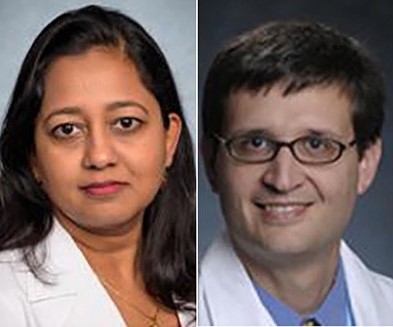 The UAB Department of Neurology has been awarded the Institutional Clinical Training Award (ICTA) by the National Multiple Sclerosis Society (NMSS). This prestigious, multi-year grant is given to institutions with a proven record in training clinical fellows in Multiple Sclerosis (MS)/Neuroimmunology.
The UAB Department of Neurology has been awarded the Institutional Clinical Training Award (ICTA) by the National Multiple Sclerosis Society (NMSS). This prestigious, multi-year grant is given to institutions with a proven record in training clinical fellows in Multiple Sclerosis (MS)/Neuroimmunology.
UAB Neurology is renowned for its clinical training strength, and this award allows the Division of MS and Neuroimmunology to focus on identifying top trainees for the foreseeable future.
Shruti Agnihotri, M.D., associate professor and Director of the Comprehensive Neurology Program, along with John Rinker II, M.D., associate professor and Director of the Medical Student Clerkship, both serve as co-directors of the Neuroimmunology and Multiple Sclerosis Fellowship Program, played pivotal roles in securing this award.
"We express our gratitude to the National Multiple Sclerosis Society for acknowledging the contributions of our faculty and former fellows,” says Agnihotri. “This training award not only supports the development of MS specialists but also contributes to positively impacting the lives of numerous MS patients in our local community and beyond."
Agnihotri and Rinker provide key insights into the significance of securing the Institutional Clinical Training Award, particularly its impact on recruiting and training new MS fellows.
Q: Why is the success of the application for this award considered significant for the department?
Only a limited number of programs nationwide have received Institutional Clinical Training Awards. Notably, this marks the first instance of a program in the Deep South securing such an award, underscoring the dedication at UAB to identifying and training prospective MS specialists.
The successful acquisition of the Institutional Clinical Training Award guarantees funding for one Multiple Sclerosis fellows annually. This achievement means that we can consistently recruit a fellow through this mechanism for the next three years without the need for annual applications. This development is particularly noteworthy, highlighting the program's national recognition and success. Furthermore, we still have an available VA position for the recruitment of another fellow in the future.
Q: How does the award impact the recruitment and training of MS fellows within the department?
Unlike fellowships accredited by the Accreditation Council for Graduate Medical Education (ACGME), fellowship training in MS and Neuroimmunology does not automatically include guaranteed funding. Aspiring neurology residents looking to specialize in MS and Neuroimmunology typically face the dual challenge of securing a position in their preferred program and obtaining funding from sources such as the National MS Society, educational grants from pharmaceutical companies, or their host institution.
By obtaining this award, the funding aspect of the process is streamlined for potential fellows, attracting a stronger pool of candidates from across the region and the country. Any fellow selected to train in our program will benefit from assured funding throughout the award's duration. Moreover, the award alleviates the need for us, as a program, to engage in grant writing during the annual application cycle each summer. This, in turn, allows us to allocate more time and attention to the development and support of our existing fellows.
Q: What was the process of securing this award? What were the roles of Agnihotri and Rinker in the application process?
The grant application stands as a collaborative effort, requiring input not only from the Fellowship Directors but also from all essential personnel within the Division of MS/Neuroimmunology and from multidisciplinary collaborators in the Department of Neurology and across the UAB Heersink School of Medicine.
The program has submitted multiple previous applications for this award, marking the third or fourth attempt. Most recently in 2022, Agnihotri led the development of the previous application, which, despite receiving a strong score, fell short of the funding pay line. This year, while Agnihotri concentrated on the individual fellowship application for the forthcoming year's fellow, Rinker revised the ICTA grant, incorporating feedback from the earlier application.